January 29, 2015
I can fairly well remember my first experience as a child visiting the dentist. Like the experience for most kids, mine held the potential to be a traumatizing event. He was an older, unfamiliar man who seemed way too anxious about becoming my friend. He placed me in this strange, inclining, mechanical chair with straps on it. How could a little kid think of anything other than Frankenstein? Then this man I didn’t know who smiled at me way too widely, who now wore a bizarre green gown and a surgical mask, shown a tremendously bright light into my eyes, pried open my mouth and squinted oddly to peer profoundly into my oral cavity. His peering had obviously not satisfied his curiosity because he continued to poke and prod in and out of every crevice with sharp metal instruments, relics of torturing tools from the Inquisition. If anyone ever wished to publish a manual on how to traumatize a kid, they would simply accurately describe a first visit to a dentist. Yet, I wasn’t traumatized. In fact, I don’t even remember any of the business end of the visit to the dentist. Still, I do remember it. What did I remember? Why wasn’t I traumatized?
Dinosaurs. After the exam and perhaps a quick brushing (I didn’t have any cavities and thus was spared the true horror of a whizzing drill), the dentist lead me, my mother in tow, to a small supply room. There, displayed on a counter at about my eye level, were herding, plastic (actually probably rubber since it was the 60’s), green, red, blue, and yellow dinosaurs. They were only about one and a half inches tall, but they were mesmerizing. Then the dentist said a truly magic word. “Pick one.” Whatever maniacal experiment this deranged man had performed on me had been worth it, because I had hit the mother lode of prizes, my own dinosaur. Though I should have been traumatized by such a foreign, terrifying event, I wasn’t. The principal part of the visit, picking out my personal dinosaur, far overshadowed the otherwise haunting, intrusive nature of having someone stare into your mouth.
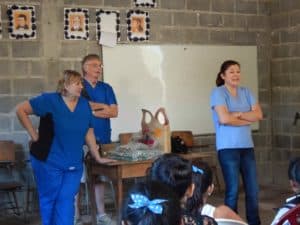
I remembered the dinosaurs, and the brilliance of my first dentist, just yesterday in a most unlikely, and yet again, foreign environment. We followed the dental brigade to the small village of El Cerrón. Though it is still vacation until February 2, the kids from the village met them at the small schoolhouse. The school is already enrolled in Shoulder to Shoulder’s school dental program. Most of them know the importance of brushing and the dangers of gluttonous consumption of sweets and junk food. They also get fluoride treatments and trips to the dental clinic when they need work. Even so, here in Honduras where dental disease from poor dental hygiene is an epidemic, the message can’t be repeated often enough. In any case, the boys all had rings on their fingers; little plastic rings that I assumed were gifts from the dental brigade. Then I noticed one boy playing with another boy, poking his ring at the other boy’s ring. I focused to see the two plastic, ring dinosaurs engaged in mortal combat. I laughed audibly. Though you may think otherwise, things have not changed that much in forty-five years. Closer scrutiny made me realize that some of the rings featured dolphins as well, and the girls had stick-on jewelry proudly attached to their bodies. When it came time for the kids to line up for their exam, when these very tall, very foreign people with bright flashlights wanted to poke around inside their mouths, the children showed no hesitancy, but rather raced to be first in line.
It really is easy to help others. It really is easy to communicate healthy habits to others. It really is easy to reach out across culture divides, to overcome the fear derived by the response to what is foreign by celebrating the joy discovered in what is shared. We do great things here at Shoulder to Shoulder, miraculous things, tear-jerking heroic things. Our brigades come down because they want to be part of it, and they are. They do miraculous things. We are proud of our and their achievements as we should be. Still it is sometimes the littlest things we do, the things most people wouldn’t notice or remember, that are the most powerful. Someone thought enough to bring dinosaurs, dolphins, and stick-on costume jewelry. Maybe even they didn’t think it would be that important, given all the heroic acts they would be involved in. But forty-five years from now, one of those kids from the small schoolhouse in El Cerrón might remember the magic of a dinosaur. Truly miraculous!!
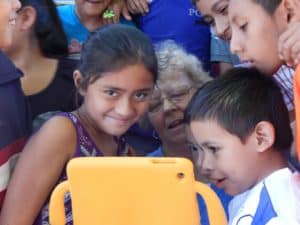
Taking Interest
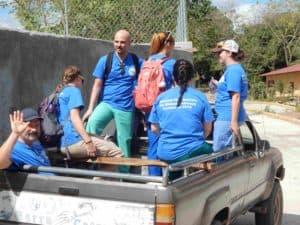
January 24, 2015
From what I heard, Buffalo, NY had about a thousand feet of snow this year. I would assume the nine graduate students and one professor from the University of Buffalo, School of Pharmacology experienced quite a shock last Monday when they arrived here in Honduras. They certainly did pick the best time of the year to come. They ended up at Shoulder to Shoulder’s clinic in Santa Lucia, one of the hottest, driest, and lowest spots in all of Honduras. The climate must have been a great shock, though perhaps a welcome one, to their bodies. The culture shock must have been pretty intense as well. They took two days to get to Santa Lucia from Tegucigalpa. They spent Monday night in a nice hotel in Siguatepeque about an hour and a half outside Tegucigalpa. The next day, however, was about five and one half hours over and down the mountains, four of which they traveled on the treacherous dirt roads, washed out and eroding. They arrived to be confronted with trickle showers, low power electricity, spotty and slow internet, the new ways of a new people, and everyone speaking Spanish.
Shoulder to Shoulder is excited to have the University of Buffalo here for the first time. The pharmacology school offers a unique brigade experience. They offered workshops with various groups like the pregnancy club in Magdalena where Laura and I met up with them. They were able to offer insight to the women relative to what medicines can and can’t be taken during pregnancy, how pharmacology works in health in general, preventative care strategies, etc. The doctors and nurses at the various clinics and health centers were impressed and pleased with the brigade work. The doctors and nurses, and even the health promoters, are so often overwhelmed dealing with large volumes of patients and emergencies that they don’t find the time for teaching prevention and home health care. The work Buffalo did was tremendously valuable and greatly appreciated.
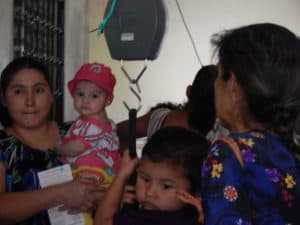
The students were thoroughly enjoying their cross-cultural, service experience. None of them spoke Spanish, though the interpreters were excellent. Many had been to foreign or developing countries in the past. Their leader student, Ciera, had been twice to the Dominican Republic on service trips. She hopes that this early commitment from Buffalo will be a long and meaningful one for the school. We hope so too. Speaking with one of the participants about how he was experiencing the culture and the people, he paused and thoughtfully reflected. He shared that so much of person’s lives in the US are consumed with the acquiring of things. Here people are much more present to other people. People really take sincere interest in one another, and things are just not so important.
We are certainly taking interest in you, Buffalo. You have so much to offer. We thank you for your generous, unselfish response. We will be looking forward to your return. Hopefully it will again be in January so you can all get away from the snow, ice, and cold.
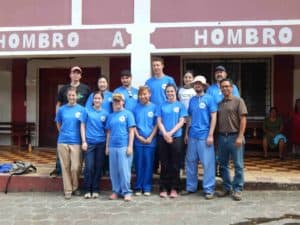
Educate a Child and Change the World
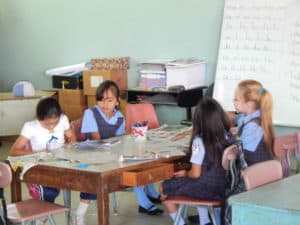
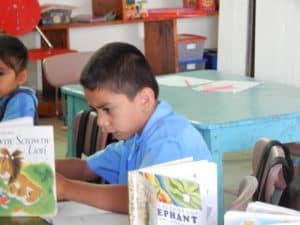
November 24, 2014
Shoulder to Shoulder is pleased and proud to introduce the Good Shepherd Bilingual School Sponsorship Program to advance our mission in the frontier region of Intibucá, Honduras.
Why Education?
The river story, often attributed to the social reformer Saul Alinsky, recounts a scene along the banks of a fast moving river. People are drowning and others are jumping into the river to save them. One individual leaves the scene to move upstream. He is initially scolded for abandoning the vital task of saving lives. But, he is actually searching out the source of the problem to learn why and how people are falling into the river in the first place, in order to resolve the issue.
Education in Honduras is certainly an upriver issue. Children are only legally required to go to school through the sixth grade. Public education is free in Honduras. But when you factor in costs of transportation, books and materials, uniforms, and so on, families that can barely feed themselves are greatly burdened by this “free” education. Public education is poorly supported by the Honduran government. Buildings are inadequate and not maintained. Materials are unavailable or offered at a price that students can’t afford. Teachers are ill-prepared. These chronic problems affect all of Honduras, but in the neglected area of the frontier region of Intibucá, they are exacerbated. Children mostly do not continue their education beyond the sixth grade. The economic reality of most families demands that they assist with farm labor or find other low paying employment. Whereas Hondurans with some financial means send their children to quality, private schools, poorer families simply do not have the opportunity.
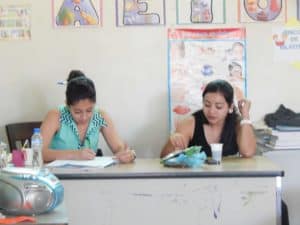
It is true enough that children are drowning. It is a faulted education system that has tossed them into the river. How many scholars, civil engineers, doctors, physicists, lawyers, artists, musicians, leaders, and visionaries are unknown to Honduras because learning was unavailable to them? It is a sobering thought.
Shoulder to Shoulder is moving upriver. Since its inception, Shoulder to Shoulder has invested in quality education for young people. Our scholarship program enables over one-hundred young people to continue their education beyond the sixth grade, even unto college. The generosity of donors is matched to young people according to merit and need. This is making a substantial difference in their lives individually as well as within the communities they come from and will go to as professionals. In 2012, Shoulder to Shoulder partnered with the Good Shepherd Community of Cincinnati and founded Good Shepherd Bilingual School in Camasca, Intibucá. The building has been erected and three grades (kindergarten, first, and second) are presently enrolled.
The school is public, accessible to everyone, and offers a quality, bilingual education. It is the only one of its kind in all of Honduras. It exists as a collaborative effort among the Honduran Government, the Municipalities of the frontier region of Intibucá, Shoulder to Shoulder, and the students’ parents. Honduras considers it a model for public education. It offers unimagined opportunities for its alumni as well as substantive change for Honduras.
Shoulder to Shoulder believes that you, our donors and benefactors, would like to be part of this historic undertaking. We humbly invite you to seriously consider sponsoring one of the Good Shepherd Bilingual School children. We are certain that this synergetic relationship of generosity and gratitude will be transformative for both you and your sponsored child. Your commitment today will illuminate the path from poverty to progress.
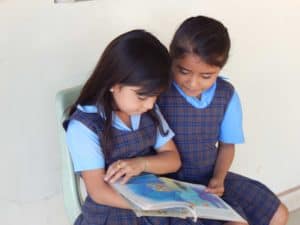
Help us to move up river! www.shouldertoshoulder.org/sponsorshipprogram


